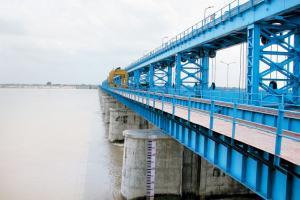Research scholar Soumendra Nath Bhanja, currently in Canada, and Yoshihide Wada from the International Institute of Applied Systems Analyses (IIASA) in Laxenburg, Austria, were also involved in the study

File pic of Ganga river
Groundwater depletion in the Gangetic aquifers of north India is possibly causing a reduction in the base flow of the mega Himalayan river, leading to it drying up during summer, according to a study.
ADVERTISEMENT
The research, undertaken by three scientists, including Abhijit Mukherjee, Associate Professor of Geology and Geophysics at IIT-Kharagpur, demonstrated quantitatively that the present phenomenon of the Ganges drying up in the summer months is possibly also dependent on the groundwater depletion in the Gangetic aquifers of north India because of extensive groundwater pumping.
Research scholar Soumendra Nath Bhanja, currently in Canada, and Yoshihide Wada from the International Institute of Applied Systems Analyses (IIASA) in Laxenburg, Austria, were also involved in the study.
"During the non-monsoon period, a river usually is fed either by glacier inflow or by input (base flow) from the groundwater system. In fact, groundwater input in the water volume of the Ganges during summer is at least 30 per cent. Decline in contribution from groundwater to the Ganges' water volume would lead to loss of its total water volume," Mukherjee told IANS.
He said the "base flow might have decreased by over 50 per cent from the beginning of irrigation-pumping age in the 1970s".
"Future (up to 2050) conservative, predictive analyses of Ganges river water-groundwater interactions, without effects of climate change or human interferences, provides an alarming scenario. The authors suggest that in the forthcoming summer for next 30 years, groundwater contribution to Ganges river water flow would continue to decrease in the impending years and can decrease up to 75 per cent of the 1970s, causing a catastrophic effect," the study suggested.
Acknowledging the study, Observer Research Foundation's (ORF) Distinguished Fellow Jayanta Bandyopadhyay said there is "a mutual bilateral link" between the water flow on the river and ground water.
A former professor at the Indian Institute of Management-Calcutta, Bandyopadhyay, pointed out that any large river feeds the ground water laterally when the level of water flow on the river is high and in return, when the flow is low, which is near to base flow, the groundwater feeds the river.
"With no availability of ground water, lean season base flow of a river depends on water coming from upstream. It is true groundwater extraction reduces water flow of the Ganges," Bandyopadhyay told IANS.
Mukherjee, however, pointed out the study is "based on satellite, modelling, chemical and isotope data as Ganges river level data is not available".
"We found that 19 satellite-based virtual stations, out of 28 such stations, showed the reduction of water," he said.
Professor K.J. Nath, one of India's foremost experts on Sanitation and Community Water Supply, Environmental Health and Public Health, termed the reduction in base flow of Ganges "a matter of concern".
Nath, who served as a Member of the National Ganga River Basin Authority (NGRBA), formed during the previous United Progressive Alliance (UPA) regime at the Centre, said: "We have been advising the government about indiscriminate use of ground water as this will not only deplete the sub-surface water resource, but will also reduce the base flow to the Ganges from adjoining aquifiers. The health of the river will be seriously jeopardised."
"It is unfortunate the Centre and the state governments have so far not developed a comprehensive policy about the conservation and utilisation of the ground water resources. Indiscriminate extraction of ground water is going on unchecked," Nath told IANS.
The continuation of the groundwater exploitation at similar per-capita rates, might jeopardise the existence of the Ganges in several reaches in the near future.
Bhanja, who ran the risk analyses, suggested that this could be "leading to a disastrous effect on the riverine ecology, as well as catastrophic effect on carbohydrate and other food scarcity for 115 million people inhabiting the study region by 2050, resulting in the unthinkable for the densely populated Ganga basin".
Again, Mukherjee warned that such trend could pose a threat not only to food security but also to the development of National Waterway -I on the Ganges along with thermal power plants and surface-based drinking water plants of National Rural Drinking Water Programme situated in the gangetic plains.
He said: "There should be a regulatory measure in place in terms of using groundwater resource for irrigation purposes because summer paddy does not need the huge amount of water which is currently being extracted."
According to him, further studies need to be done to "intricately understand the groundwater and river water interactions at each location for better, integrated water management".
Echoing Mukherjee, Bandyopadhyay said extraction of groundwater "must be brought under some sort of regulation" and laws related to it need to be altered as groundwater is a limited resource.
Catch up on all the latest Crime, National, International and Hatke news here. Also, download the new mid-day Android and iOS apps to get latest updates
 Subscribe today by clicking the link and stay updated with the latest news!" Click here!
Subscribe today by clicking the link and stay updated with the latest news!" Click here!






